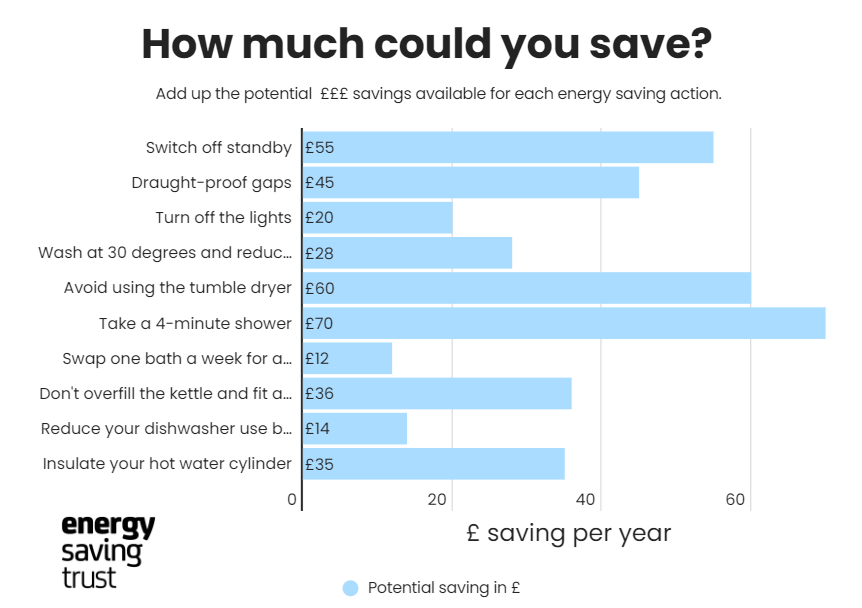-
12 East Street, Whitburn, SR6 7BX
-
0191 406 5300
-
info@highlyefficientheating.com
Energy Saving Tips & Advice
Before you start
Understand your energy bill. The information on a typical energy bill can be confusing, but understanding it can go a long way to helping you get to grips with your energy use at home. This video from Home Energy Scotland is a helpful guide.
Switch off standby
You can save around £55 a year just by remembering to turn your appliances off standby mode.
Almost all electrical appliances can be turned off at the plug without upsetting their programming. You may want to think about getting a standby saver or smart plug which allows you to turn all your appliances off standby in one go.
Check the instructions for any appliances you aren’t sure about. Some satellite and digital TV recorders may need to be left plugged in so they can keep track of any programmes you want to record.
Draught-proof windows and doors
Unless your home is very new, you will lose some heat through draughts around doors and windows, gaps around the floor, or through the chimney.
Professional draught-proofing of windows, doors and blocking cracks in floors and skirting boards can cost around £225, but can save around £45 a year on energy bills. DIY draught proofing can be much cheaper.
Turn off lights
Turn your lights off when you’re not using them or when you leave a room. This will save you around £20 a year on your annual energy bills.
Replacing all the lights in your home with LED bulbs could help you save even more.
Careful with your washing
You can save around £28 a year from your energy bill just by using your washing machine more carefully:
Use your washing machine on a 30-degree cycle instead of higher temperatures.
Reduce your washing machine use by one run per week for a year.
Avoid the tumble dryer
Avoid using a tumble dryer for your clothes: dry clothes on racks inside where possible or outside in warmer weather to save £60 a year.
Spend less time in the shower
Keeping your shower time to just 4 minutes could save a typical household £70 a year on their energy bills.
Swap your bath for a shower
Some of us might enjoy a long soak in the bath, but swapping just one bath a week with a 4-minute shower could save you £12 a year on your energy bills.
Find out how saving water at home can help your wallet and the environment.
Be savvy in the kitchen
Kettles are one of the most used appliances in the kitchen. But many of us will admit that we at least occasionally boil the kettle with more water than we’re going to use.
Avoid overfilling the kettle and save yourself £11 a year on your electricity bill.
You could also consider fitting an aerator onto your existing kitchen tap to reduce the amount of water coming out without affecting how it washes or rinses. An aerator is a small gadget with tiny holes – they attach to the spout of taps and are cheap and easy to install – and could save you £25 a year.
Fill your dishwasher
Only run your dishwasher when it is full to reduce the amount of water you use. Reducing your dishwasher use by one run per week for a year could save you £14.
Top up the insulation
Effective insulation of your hot water cylinder is important: even if you have thin spray foam or a loose 25mm jacket, you can benefit from increasing the insulation to a British Standard Jacket 80mm thick, saving £35 a year in the process.
Insulating your water tank, pipes and radiators is a quick and easy way to save money on your bills.
Source: https://energysavingtrust.org.uk/hub/quick-tips-to-save-energy/
Understand your energy bill. The information on a typical energy bill can be confusing, but understanding it can go a long way to helping you get to grips with your energy use at home. This video from Home Energy Scotland is a helpful guide.
Switch off standby
You can save around £55 a year just by remembering to turn your appliances off standby mode.
Almost all electrical appliances can be turned off at the plug without upsetting their programming. You may want to think about getting a standby saver or smart plug which allows you to turn all your appliances off standby in one go.
Check the instructions for any appliances you aren’t sure about. Some satellite and digital TV recorders may need to be left plugged in so they can keep track of any programmes you want to record.
Draught-proof windows and doors
Unless your home is very new, you will lose some heat through draughts around doors and windows, gaps around the floor, or through the chimney.
Professional draught-proofing of windows, doors and blocking cracks in floors and skirting boards can cost around £225, but can save around £45 a year on energy bills. DIY draught proofing can be much cheaper.
Turn off lights
Turn your lights off when you’re not using them or when you leave a room. This will save you around £20 a year on your annual energy bills.
Replacing all the lights in your home with LED bulbs could help you save even more.
Careful with your washing
You can save around £28 a year from your energy bill just by using your washing machine more carefully:
Use your washing machine on a 30-degree cycle instead of higher temperatures.
Reduce your washing machine use by one run per week for a year.
Avoid the tumble dryer
Avoid using a tumble dryer for your clothes: dry clothes on racks inside where possible or outside in warmer weather to save £60 a year.
Spend less time in the shower
Keeping your shower time to just 4 minutes could save a typical household £70 a year on their energy bills.
Swap your bath for a shower
Some of us might enjoy a long soak in the bath, but swapping just one bath a week with a 4-minute shower could save you £12 a year on your energy bills.
Find out how saving water at home can help your wallet and the environment.
Be savvy in the kitchen
Kettles are one of the most used appliances in the kitchen. But many of us will admit that we at least occasionally boil the kettle with more water than we’re going to use.
Avoid overfilling the kettle and save yourself £11 a year on your electricity bill.
You could also consider fitting an aerator onto your existing kitchen tap to reduce the amount of water coming out without affecting how it washes or rinses. An aerator is a small gadget with tiny holes – they attach to the spout of taps and are cheap and easy to install – and could save you £25 a year.
Fill your dishwasher
Only run your dishwasher when it is full to reduce the amount of water you use. Reducing your dishwasher use by one run per week for a year could save you £14.
Top up the insulation
Effective insulation of your hot water cylinder is important: even if you have thin spray foam or a loose 25mm jacket, you can benefit from increasing the insulation to a British Standard Jacket 80mm thick, saving £35 a year in the process.
Insulating your water tank, pipes and radiators is a quick and easy way to save money on your bills.
Source: https://energysavingtrust.org.uk/hub/quick-tips-to-save-energy/

*Savings are for a typical three-bedroom, gas-heated home in Great Britain, using a gas price of 7.4p/kWh and electricity price of 28.3p/kWh (based on April 2022 price cap). Water savings are based on average occupancy. This household is projected to spend a total £1,970 on energy annually, including standing charge. Figures updated March 2022.

